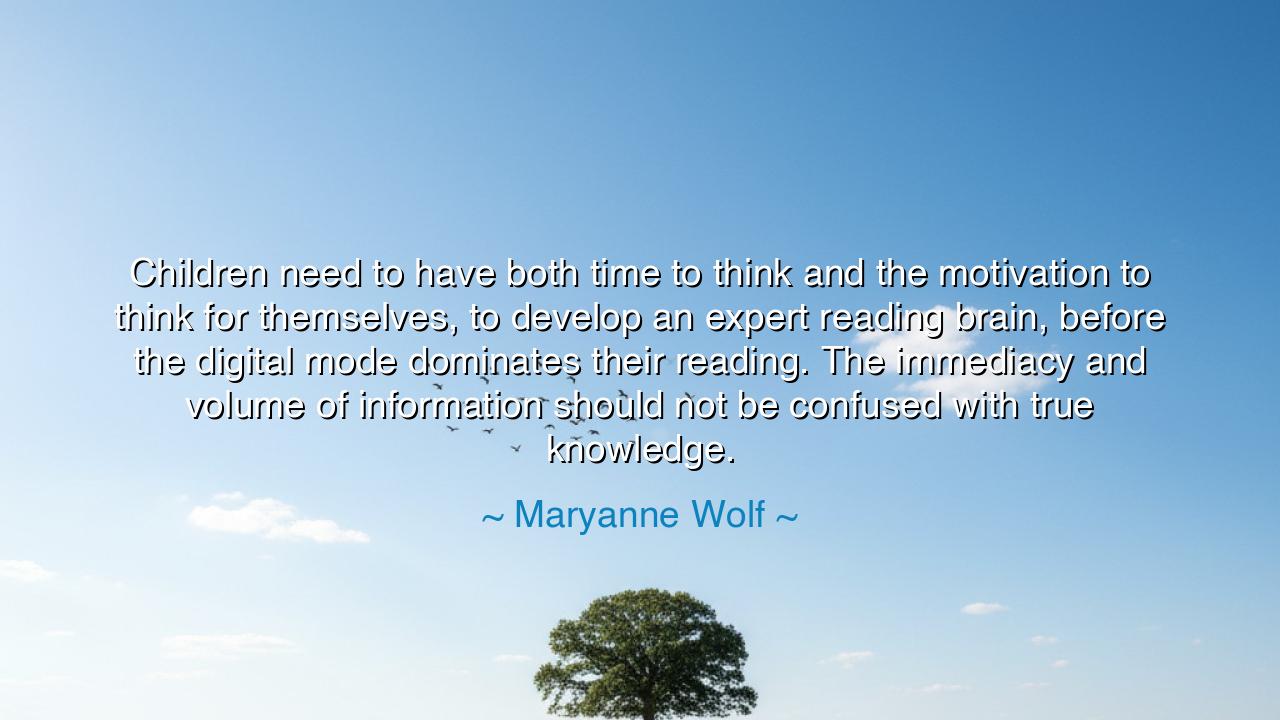
Children need to have both time to think and the motivation to
Children need to have both time to think and the motivation to think for themselves, to develop an expert reading brain, before the digital mode dominates their reading. The immediacy and volume of information should not be confused with true knowledge.






The scholar Maryanne Wolf, a guardian of the written word in the age of screens, once spoke with quiet urgency: “Children need to have both time to think and the motivation to think for themselves, to develop an expert reading brain, before the digital mode dominates their reading. The immediacy and volume of information should not be confused with true knowledge.” In these words lies a profound warning — not against progress, but against forgetfulness. She reminds humanity that the mind is a sacred instrument, one that must be trained in stillness before it can discern truth in the flood of noise.
The origin of this wisdom comes from Wolf’s lifelong study of how the human brain learns to read. Unlike speech, which nature gave us, reading is an invention — a miracle of adaptation that reshapes the very structure of the brain. When a child learns to read deeply, the mind forges new connections between perception, memory, and emotion. It is through this slow, deliberate process that empathy, reflection, and critical thought take root. But in the age of digital immediacy — where a thousand fragments replace a single sustained thought — the reading brain faces extinction. Wolf’s words rise as a plea to preserve this most human of capacities before it is lost to haste.
To think for oneself requires more than exposure to information; it requires digestion, contemplation, and questioning. The digital world offers volume without depth, a feast of endless data that nourishes nothing. A child raised on the flicker of screens may learn to skim, but not to ponder; to react, but not to reason. As Wolf warns, the danger is subtle yet grave: when speed replaces depth, wisdom is replaced by opinion, and the heart of understanding grows shallow. Knowledge is not the sum of what we consume — it is what we transform through thought.
History, too, offers echoes of this truth. In the Library of Alexandria, scholars once gathered not to scroll, but to study — to dwell upon each word as a doorway to the infinite. Their minds, forged in patience, gave rise to philosophy, mathematics, and literature that shaped civilization for millennia. When that library burned, humanity lost more than parchment; it lost memory itself. Today, Wolf reminds us, another kind of fire threatens — not of flame, but of forgetfulness, as the digital tide sweeps away our capacity for reflection.
To develop an expert reading brain, a child must dwell in the realm of words — to read stories that demand attention, to wrestle with meanings that are not instantly given. This is how the mind learns empathy: by stepping into another’s thoughts and emotions, by living in the silences between words. The screen, by contrast, offers no silence. It shouts, distracts, and commands the eye to move on before the heart can feel. Without stillness, imagination withers; without imagination, wisdom cannot grow.
Yet the lesson of Wolf’s words is not despair, but balance. The digital mode is not the enemy — it is a tool. But tools must serve the soul, not rule it. The wise parent, the wise teacher, will give children both the gifts of the modern world and the discipline of the ancient one: moments without noise, pages without glow, thoughts unbroken by interruption. Let the child learn first to listen inwardly before listening to the machine. For only the still mind can discern truth in a world of endless chatter.
And so, let this teaching be carried forward: do not confuse information with knowledge, nor knowledge with wisdom. Make time each day to read without haste — to think, to question, to let the mind breathe. Teach children not only to read, but to linger. Let them grow roots in the soil of thought before the winds of speed uproot them.
For as Maryanne Wolf reminds us, the future of wisdom depends not on how fast we can read, but on how deeply we can think. The true wealth of the human spirit is not measured in bytes or clicks, but in the silent power of reflection — that sacred space where knowledge becomes understanding, and understanding becomes light.






AAdministratorAdministrator
Welcome, honored guests. Please leave a comment, we will respond soon